|
|
|
Sort Order |
|
|
|
Items / Page
|
|
|
|
|
|
|
| Srl | Item |
| 1 |
ID:
190840
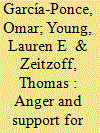

|
|
|
|
|
| Summary/Abstract |
How does exposure to criminal violence shape attitudes towards justice and the rule of law? Citizens care about crime prevention and procedural legality, yet they also value punishing perpetrators for the harm they have done. We argue that anger induced by exposure to criminal violence increases the demand for retribution and harsh punishments, even at the expense of the rule of law. We test this theory using one observational and two experimental studies from an original survey of 1,200 individuals in Western Mexico, a region affected by organized criminal violence and vigilantism. First, we first show that exposure to violence is correlated with increased anger and support for punitive justice, including vigilante actions. Second, across our two experiments, we show that citizens are more supportive of harsh punishments and place less value on their legality in response to morally outrageous crimes. Third, we find that the innocence of the victim, rather than the severity of the crime, is what triggers outrage and punitiveness. This suggests that citizens may support extreme levels of violence as long as they perceive that its targets are criminals. Finally, we show that outrageous forms of violence against civilians can lead individuals to prioritize harsh punishment regardless of its legality. When criminal actors target perceived innocents with common crimes like extortion, there is greater support for harsh, vigilante action. These patterns provide a bottom-up explanation for harsh justice.
|
|
|
|
|
|
|
|
|
|
|
|
|
|
|
|
| 2 |
ID:
154543
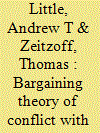

|
|
|
|
|
| Summary/Abstract |
Bargaining models play a central role in international relations, particularly in the study of conflict. A common criticism of this approach is that it fails to account for nonmaterial (e.g., psychological) factors that may influence the bargaining process. We augment a standard bargaining model by allowing actors’ preferences over conflict to diverge from the “fitness” payoffs (e.g., resources) typical of such models. Preferences are subject to evolutionary forces—those who attain high fitness reproduce more. We find that (1) there is a trade-off where being “irrationally” tough leads to better bargains but also more inefficient conflict; (2) actors develop behavioral biases consistent with empirical findings from psychology and behavioral economics; and (3) these behavioral biases inevitably lead to conflict. By bridging the strategic and psychological approaches to conflict, our models provide new insights into questions such as how changes in military and intelligence-gathering technology affect the likelihood and expected cost of war, and how to interpret the purported decline of violence over recent human history.
|
|
|
|
|
|
|
|
|
|
|
|
|
|
|
|
| 3 |
ID:
196011


|
|
|
|
|
| Summary/Abstract |
Much of the focus of cyber conflict has been on interstate conflict. This article focuses on two interrelated questions in the important but neglected area of cyber contentious politics. First, how does the public feel about the use of different eco tactics including cyber-based tactics carried out by activists involved in the radical environmental movement, a movement that uses protest and sabotage in service of environmental causes? Second, how do anti-technology sentiment and concerns about climate change influence support for different eco tactics? To answer these questions, we conduct a survey and survey experiment on a nationally diverse sample of Americans. We find that Americans are less supportive of certain eco tactics, particularly those that involve property destruction or physical sabotage compared to cyber-based tactics. We further show that anti-technology sentiment and perceived threat from climate change are correlated with increased support for eco direct actions. Using a survey experiment we show that cyber direct actions that result in sabotage are viewed as more acceptable than kinetic actions even though they both result in the same level of destruction. Finally, we include qualitative data from interviews with activists to better understand the strategy and role that new technology and tactics play in the broader radical environmental movement.
|
|
|
|
|
|
|
|
|
|
|
|
|
|
|
|
| 4 |
ID:
157508
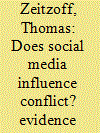

|
|
|
|
|
| Summary/Abstract |
How does international public support via social media influence conflict dynamics? To answer this question, I construct a unique, extremely disaggregated data set drawn from social media sources to examine the behavior of Israel and Hamas during the 2012 Gaza Conflict. The data set contains conflict actions and international audience behavior at the hourly level for the full 179 hours of the conflict. Notably, I also include popular support for each side from international audiences on social media. I employ a Bayesian structural vector autoregression to measure how Israel’s and Hamas’s actions respond to shifts in international public support. The main finding is that shifts in public support reduce conflict intensity, particularly for Israel. This effect is greater than the effect of the key international actors—United States, Egypt, and United Nations. The results provide an important insight into how information technology is changing the role of international audiences in conflict.
|
|
|
|
|
|
|
|
|
|
|
|
|
|
|
|
| 5 |
ID:
155782
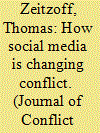

|
|
|
|
|
| Summary/Abstract |
Social media increasingly plays a role in conflict and contentious politics. Politicians, leaders, insurgents, and protestors all have used it as a tool for communication. At the same time, scholars have turned to social media as a source of new data on conflict. I provide a framework for understanding social media’s influence on conflict through four interrelated points: (1) social media reduces the costs of communication, (2) it increases the speed and dissemination of information, (3) scholars should focus on the strategic interaction and competitive adaption of actors in response to communication technology changes, and (4) the new data that social media provides are not only an important resource, but also fundamentally change the information available to conflict actors, thereby shaping the conflict itself. In sum, social media’s influence on conflict defies simplistic explanations that argue that it privileges incumbents or challengers.
|
|
|
|
|
|
|
|
|
|
|
|
|
|
|
|
| 6 |
ID:
158690
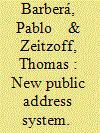

|
|
|
|
|
| Summary/Abstract |
The growth of social media—and, in particular, Twitter and Facebook—has led scholars to study its effects on mass behavior and protest. But leaders are also active on social media. They use their accounts to communicate with domestic and international audiences. By the end of 2014, more than 76 percent of world leaders had an active presence on social media. What explains variation in their adoption and use of social media? We look at several different potential hypotheses: higher income per capita and internet penetration (modernization), social pressure, level of democratization, and geographic spread of adoption (diffusion). We find strong support that (1) increased political pressure from social unrest and (2) higher levels of democratization correlate with leader adoption of social media platforms. Although our findings are correlational, they reveal that institutional and political pressures are related to social media adoption and the political communication of world leaders.
|
|
|
|
|
|
|
|
|
|
|
|
|
|
|
|
| 7 |
ID:
133946
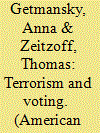

|
|
|
|
|
| Publication |
2014.
|
| Summary/Abstract |
How does the threat of becoming a victim of terrorism affect voting behavior? Localities in southern Israel have been exposed to rocket attacks from the Gaza Strip since 2001. Relying on variation across time and space in the range of rockets, we identify the effect of this threat on voting in Israeli elections. We first show that the evolution of the rockets' range leads to exogenous variation in the threat of terrorism. We then compare voting in national elections within and outside the rockets' range. Our results suggest that the right-wing vote share is 2 to 6 percentage points higher in localities that are within the range-a substantively significant effect. Unlike previous studies that explore the role of actual exposure to terrorism on political preferences and behavior, we show that the mere threat of an attack affects voting.
|
|
|
|
|
|
|
|
|
|
|
|
|
|
|
|
| 8 |
ID:
109934
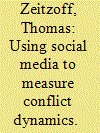

|
|
|
|
|
| Publication |
2011.
|
| Summary/Abstract |
The lack of temporal disaggregation in conflict data has so far presented a strong obstacle to analyzing the short-term dynamics of military conflict. Using a novel data set of hourly dyadic conflict intensity scores drawn from Twitter and other social media sources during the Gaza Conflict (2008-2009), the author attempts to fill a gap in existing studies. The author employs a vector autoregression (VAR) to measure changes in Israel's and Hamas's military response dynamics immediately following two important junctures in the conflict: the introduction of Israeli ground troops and the UN Security Council vote. The author finds that both Hamas's and Israel's response to provocations by the other side increase (both by about twofold) immediately after the ground invasion, but following the UN Security Council vote, Israel's response is cut in half, while Hamas's slightly increases. In addition, the author provides a template for researchers to harness social media to capture the micro-dynamics of conflict.
|
|
|
|
|
|
|
|
|
|
|
|
|
|
|
|
|
|
|
|
|